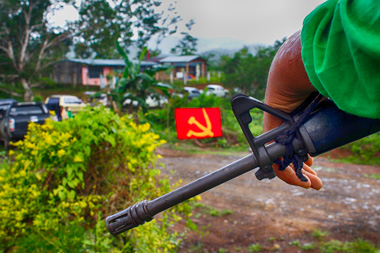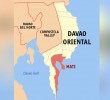DAVAO CITY – A Moro National Liberation Front faction has urged Malacañang to resolve the three remaining issues on territory, provisional government and definition and sharing of revenues of strategic minerals to complete the government commitment to pass an amended law to implement the final peace agreement they reached in 1996.
Romeo Sema, executive director of the General Secretariat of the MNLF-Executive Council of 15 (MNLF-EC15) said “the MNLF wants the PH government to implement the 1996 Final Peace Agreement (FPA) in “spirit and letter”. He said a “law must be crafted containing all the provisions contained in the 1996 FPA.”
The law which Sema referred to would be an amended version of the Republic Act 9054, or the Organic Law that created the Autonomous Region in Muslim Mindanao, which was also the political body tendered to the MNLF to agree to a comprehensive settlement of the armed conflict it waged in Mindanao since 1968.
An amendatory law to the Organic Act would have been the implementing law of the 1996 peace agreement that was also recommended by the tripartite review conducted by the two parties and with the participation of the pan-Arabic Organization of Islamic Conference.
The MNLF faction led by Sema’s brother, former Cotabato City Mayor Muslimin Sema, said “that from 1996 to present, the law was never passed”.
“The government must agree to rectify the mistakes via a tripartite review of the implementation of the peace agreement,” Romeo Sema said.
RA 9054 violates 1996 FPA, 1976 Tripoli Agreement Sema said that the MNLF has continously rejected the ARMM law (RA
9054) because “it violates the provisions of Part III (Phase 2) of the 1996 FPA which is the New Regional Autonomous Government.”
“The August 14, 2001 plebiscite was conducted with due haste and without participation of the MNLF because the amendatory law is contrary to the letter and spirit of the 1976 Tripoli Agreement and 1996 FPA,” Sema told DavaoToday.
The MNLF-Sema faction asserted that the territory of the autonomous region comprises the 15 provinces of the Bangsamoro Homeland stipulated in the MNLF-OIC-GPH [government of the Republic of the Philippines] 1976 Tripoli Agreement and its implementing mechanism–the 1996 FPA.
The ARMM covers the provinces of Maguindanao and Lanao del Sur, including Marawi City, in mainland Mindanao, and the southwestern island provinces of Basilan, Sulu and Tawi.
“The GPH erred in arguing that the result of the plebiscite held in the year 2001 is the final determination of the territory of the
autonomous region and therefore it is prohibited to hold another plebiscite,” said Sema.
The government, in its policy brief obtained by DavaoToday, explained that “another plebiscite will be held upon passage of a new basic law. The issue on the expansion of territory will be decided by Congress as will be incorporated in the said new basic law.”
Creation of provisional government Sema also said that while the amendatory law is being drafted there must be a provisional government that will be established. “The transition mechanism must be given sufficient time so that necessary information will be conveyed properly to the people living in 13 provinces before the conduct of any plebiscite.”
But the government noted that “the 1996 FPA does not provide for a provisional government in the ARMM territory, but for the
establishment of a “transitional implementing structure and mechanism,” which was satisfied through the establishment of the
Southern Philippines Council for Peace and Development (SPCPD) that was chaired by Nur Misuari.”
Sema maintained its opposition that “when the law will be crafted by Congress, it shall be submitted to a plebiscite in all the provinces and cities identified in the 1976 Tripoli Agreement and the 1996 FPA.”
On sharing, mining of strategic minerals The MNLF-Sema faction also scored the GPH for “unilaterally defining
strategic mines and minerals, which violates the agreement.”
“Only Uranium is identified to be a strategic mineral while other natural resources are property of the autonomous government with 70% for the autonomous government and 30% for the central government,” Sema said.
The government invoked the “Regalian Doctrine” which maintains that the Philippine state is the absolute owner of all mines and minerals which Sema claimed as “violative to the Paragraph 145 of the 1996 FPA.”
Paragraph 145 of the 1996 FPA vested full autonomy to the Regional Autonomous Government the control and supervision over the exploration, exploitation, development, utilization and protection of mines and minerals in the area of the autonomy.
“Not to grant this power to the autonomous government is blatant discrimination against the Bangsamoro peoples,” Sema said. (davaotoday.com)
BAC, Comprehensive Agreement on the Bangsamoro, FPA, Peace Process, SEMA, tagum









